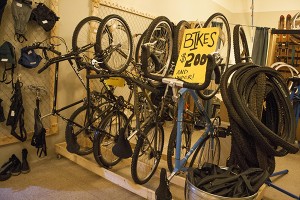That old bicycle with busted brakes living in your basement, begging for a new life, could find one at Marquette’s newest bike shop. Revolutions is different than any other bike shop in Marquette. A 501 (c) (3) non-profit, the bike shop’s main focus is to provide bicycle repair programs for the youth in the community, co-founder and shop coordinator Mike Hall said.
“[We want to give] kids the knowledge to fix their own bikes so they are not hindered by a small mechanical failure like a flat tire or a rusty chain or something not fitting right or skis that don’t fit right or boots that don’t fit right,” Hall said. “So we figured, what better way to eliminate that than to give them that knowledge?”
Co-founder and executive director Lindsay Bean said it also provides a different outlet for kids that might not benefit from a competitive environment.
“Competition isn’t always the best avenue for [gaining self-esteem and self-sufficiency],” Bean said. “So [we offer] a positive learning environment, positive social environment where kids can gain self-confidence and feel good about themselves without having it attached to their performance in a sporting competition.”
The first Revolutions programs start Wednesday, Oct. 28 and Thursday, Oct. 29. Programs are split up into two sessions, one for 11 to 14-year-olds and the other geared toward 15 to 17-year-olds.
Revolutions is always looking for volunteers to help out with the sessions, said Hall.
“You don’t have to be an expert bike mechanic,” Bean said. “You just have to be enthusiastic, you have to be motivated, you have to believe in what we are doing. You just have be interested in bikes.”
“I’m just really excited to be doing something that’s helping kids,” senior outdoor recreation leadership and management major Eric Creel said, who is also a board member and treasurer at Revolutions. “Something that’s good for themselves, getting active, learning practical skills, things that they can do to better themselves later in life.”
Volunteers must be able to make a time commitment of four or five hours a week for the length of the program.
This is to help form bonds with the kids, Bean said.
“Just like we want the kids to be committed and to continue coming every week, we want the volunteers to be a part of that group, so that the kids that come have the same adults every time,” Bean said.
Setting up a non-profit is not the easiest task to undertake.
“The only document I’ve done that was larger and more in depth than [the non-profit application] was a master’s thesis,” Bean said.
But it is the most beneficial way to provide the services free of charge, Bean said. “If it can’t be free I don’t want to do it, and so if the program is going to be free it has to be funded somehow, so being able to ask for money, being able to ask for grants, is a really big bonus, because you have to be able to make money for it somehow,” Bean said.
Bean said they hope to become self-sufficient by utilizing the retail space as their primary fund source. But that can only happen if people donate old equipment.
Hall said it all goes to a good cause and benefits your community.
Free up some space in your closet and donate that old pair of skis that haven’t been used in years, or the bike with that wobbly tire.
For more information on the bike shop, store hours and location visit their website www.revolutionsyouth.org.





























